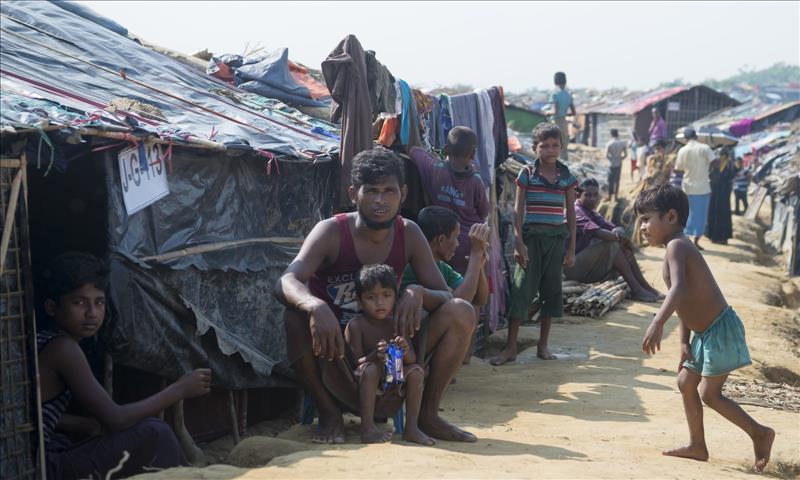
In Myanmar good Intentions led to bad outcomes
Foreign interventionism requires a far more delicate and open-minded strategy than the prevailing West-is-best narrative. Indeed, it's clear that attempts to promote Western values and shape developing nations in the West's image can do more harm, despite altruistic intentions.
Myanmar is a case in point. The international community has largely approached peace and development in the country in black and white terms, with the wider lessons of Iraq and Afghanistan going unheeded.
The daily<> Must-reads from across Asia - directly to your inboxTake the recent charges against Facebook. It's now well-established that the social media giant helped to fan the violence against the Rohingya in Myanmar, by providing a platform for anti-Muslim Buddhist nationalists and incendiary fake news.
When former president Thein Sein began rapidly liberalizing the country in 2011 from decades of authoritarian rule, including loosening censorship and widening internet access — alongside incentives from the West in the form of reduced sanctions and international legitimacy — it was, understandably, met with widespread praise from the global community. After all, free media is a crucial building block for democracy.
Unintended consequences not foreseenThe drive for further reforms called for caution. Could a country with poor education, weak media, and the vestiges of conflict safely and responsibly adopt the unfettered democratic tools of a free press and the internet in such a short time? The answer is clearly no. But rapid "democratic reforms" and desire to turn Myanmar into a symbol of hope blinded the international community to any unintended consequences.
Certainly, the US and Europe may have learned that planting free and fair elections doesn't lead to democracy, but they haven't yet recognized that the same should apply to the country's institutional pillars. A legislature, executive, judiciary, and media cannot be imposed overnight. They first require a strong social, economic, and political ecosystem.
In this context, it's unsurprising that Aung San Suu Kyi's National League for Democracy has maintained controls on free speech, even if for their political advantage, despite international pressure. That's because it can easily point to its role in fueling hate speech and misinformation.
Support from the West came up shortIndeed, the restless push for democratization in Myanmar, including incentives and support for the government to do so, ignored the lack of a culture to support its use effectively. When it came to ushering in a free press and unfettered internet access, the West should have done more to help support the emergence of critical thinking, skilled journalists, and advised on how to manage the risks of free speech in a regulated transition. But now, selling further free speech reforms to the NLD, and reconciling hardened ethnic fractiousness, will be substantially harder.
There are also unintended consequences emanating from the international media and diplomatic community's impulse to condemn the military atrocities against the Rohingya in August. While it was both unsurprising and welcomed, it lacked depth and an understanding of the use of language on the prospects for peace.
Firstly, the weight given to Rohingya suffering may have acted to alienate ethnic Rakhine Buddhists who have been violently feuding with the Muslim minority for years in the northwestern state. The sense of minimal international support for their grievances is likely to only perpetuate their desperation and further violence.
Criticism generates mistrust of foreignersMoreover, limited criticism of the Arakan Rohingya Salvation Army —which attacked military posts — and considers itself guardians for the minority, only played into the hands of Buddhist nationalists who see them as a terrorist group, and the military as their defenders. That only generated further mistrust of foreign actors.
At the same time, with the government conscious of alienating its electorate, alongside the loud international criticisms of its response to the Rohingya crisis, the NLD has distanced itself from the global community. So, in its narrow drive to criticise the atrocities — and not consider the plight and positions of all groups — the West has lost trust and communication channels with core stakeholders to build peace.
None of this pardons the military, the NLD, or Suu Kyi, but it should put the international community's role in Myanmar under more intense light, and encourage introspection.
We need to avoid the urge of using developed countries as benchmarks for intervening in the developing world. Indeed, by impatiently pursuing the ends of peace and democracy through our actions, we can circumvent the complex and necessary processes needed to get there —thereby actually leaving even more havoc in our wake.
Asia Times is not responsible for the opinions, facts or any media content presented by contributors. In case of abuse, click here to report . <> <> <> <>
Legal Disclaimer:
MENAFN provides the
information “as is” without warranty of any kind. We do not accept
any responsibility or liability for the accuracy, content, images,
videos, licenses, completeness, legality, or reliability of the information
contained in this article. If you have any complaints or copyright
issues related to this article, kindly contact the provider above.


















Comments
No comment